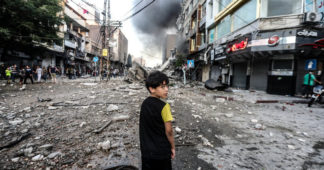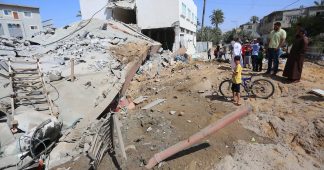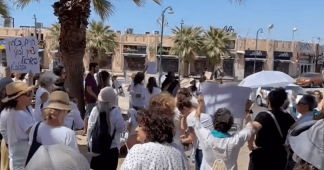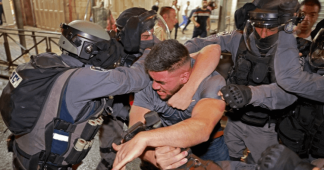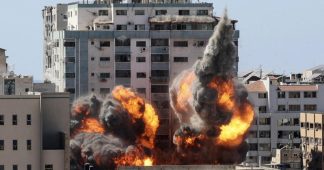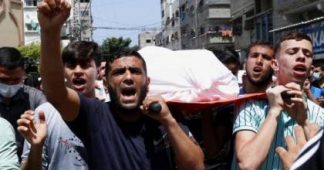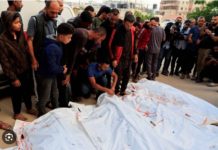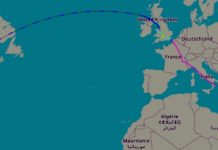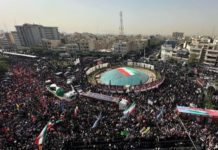By
22 May 2021
photo: APA images
Israeli police attacked Palestinians at Jerusalem’s al-Aqsa mosque compound on Friday mere hours after a ceasefire halted hostilities in Gaza and Israel.
“Police fired stun grenades and tear gas, and Palestinians hurled rocks after hundreds took part in a celebratory demonstration in which they waved Palestinian and Hamas flags,” Al Jazeera reported.
Watch as Israeli forces storm Al-Aqsa Mosque compound and fire tear gas at Palestinians celebrating the ceasefire after Friday prayers.
? LIVE updates: https://t.co/v8UKhitk1T pic.twitter.com/xM34b7iIJ6
— Al Jazeera English (@AJEnglish) May 21, 2021
Videos showed massive celebrations in Jerusalem after the ceasefire took effect and before the assault at al-Aqsa:
نصر لا رجعة عنه ?#فلسطين_تنتصر #اسرائيل_سقطت pic.twitter.com/I6wsOr5Tgc
— Owis Akkad أويس عقاد (@akkadowis) May 21, 2021
Jerusalem is celebrating ❤️pic.twitter.com/zs3YnbvyQo
— Marwa Fatafta // مروة فطافطة #SaveSheikhJarrah (@marwasf) May 21, 2021
This is incredible. #FreePalestine pic.twitter.com/FkkpCTizYY
— Diana Buttu (@dianabuttu) May 21, 2021
Israeli aggression against worshippers at al-Aqsa was the spark that ignited the Gaza escalation nearly two weeks earlier.
Like Friday’s violence, that assault came after Palestinians celebrated a humiliating Israeli setback, this time in Jerusalem, after the cancelation of an annual march of extremist Jewish settlers under the banner of Jerusalem Day.
Israeli police laid siege to and attacked the al-Aqsa mosque, while it was filled with Ramadan worshippers on 10 May, injuring hundreds.
This followed similar assaults in previous days.
Hamas launched rockets from Gaza after Israel failed to respond to an ultimatum to withdraw its forces from al-Aqsa and the occupied East Jerusalem neighborhood of Sheikh Jarrah, and free detainees.
That same day, the Israeli high court postponed a hearing on the forced expulsion of eight Palestinian families from the homes in which they’ve lived for decades in the Jerusalem neighborhood of Sheikh Jarrah to make way for Jewish settlers.
The evictions are an illegal application of Israel’s “discriminatory domestic law to occupied territory,” according to Addameer, a Palestinian human rights group.
In the preceding three weeks, at the start of Ramadan, Israeli forces cut wires to speakers broadcasting the call to prayer from al-Aqsa mosque, according to Addameer. Authorities also put barriers around the Damascus Gate to Jerusalem’s Old City, assaulting Palestinians and preventing their assembly.
“Further provocation was incited by Israeli settlers in the evening of 22 April, who roamed the streets chanting ‘death to Arabs’ and targeting Palestinian civilians,” Addameer said.
And so the worst episode of violence since 2014 was set in motion. More than 240 lives were lost in Gaza, 12 in Israel, thousands more were injured and infrastructure in Gaza was broadly destroyed.
Girl’s body recovered from rubble
The death toll in Gaza increased on Friday as bodies were recovered from the rubble.
Defense for Children International Palestine, a human rights group, said that it had verified the deaths of 67 children in Gaza after the body of Mariam Muhammad Odeh Talbani, 2 years old, was found under the rubble of her home on Friday.
The girl “had been missing and presumed dead since 12 May,” the rights group said, nine days after an Israeli airstrike on her home in Gaza City that also killed her 4-year-old brother Zaid and her pregnant mother Rima.
“Thirteen-year-old Hala Hussein Rafat Rifi was killed in the same attack, as well as two other adults,” Defense for Children International Palestine added
The Israeli attack on Mariam's home was so huge and violent, and she was so tiny, that it took nine full days to find her body under the rubble. #GazaUnderAttack https://t.co/RqHvbji95O
— Miranda Cleland (@MirandaCleland) May 21, 2021
The United Nations human rights office said that it had verified that 242 Palestinians had been killed in Gaza and that at least 129 of them were civilians.
“At least 230, including 62 children, were seemingly killed by Israeli forces,” the UN said, adding that some fatalities may have been as a result of rockets fired from Gaza that fell short.
“At least 14 families in Gaza have lost three or more family members in the same incident, for a total of 77 fatalities,” according to the UN
With the ceasefire in #Gaza coming into effect today, our Gaza team continue to share their stories of living under Israeli bombardment.
This is the horrific moment a team member's home was damaged in an airstrike on a tower block nearby. Read her story: https://t.co/HCTCiU6j5S pic.twitter.com/vIOhZyW5Yv
— Medical Aid for Palestinians (@MedicalAidPal) May 21, 2021
Nearly 2,000 people were injured, many requiring “extensive surgery and rehabilitation to recover,” the UK charity Medical Aid for Palestinians noted.
The charity added that the mental health impact “is immense, particularly for a population already traumatized by repeated military offensives and 14 years of illegal closure and blockade.”
Two doctors and a psychologist were among those killed in Gaza, according to the group.
Both the World Health Organization and the International Committee of the Red Cross urgently called for medical supplies to Gaza, where the healthcare sector is on the verge of collapse.
Fabrizio Carboni, regional director of the International Committee of the Red Cross, said that “It will take years to rebuild – and even more to rebuild the fractured lives.”
Palestinian authorities in Gaza said that Israeli strikes caused $40 million in damage to factories and industry and $22 million in damage to the energy sector, Reuters reported.
Israeli attacks caused $27 million in damage to greenhouses, agricultural lands and poultry farms, Gaza’s agriculture ministry said
Most of the 91,000 Palestinians who fled their Gaza homes as Israel targeted residential buildings began to return to their homes on Friday.
Most sought refuge in UN-flagged schools, raising worry over a renewed surge of COVID-19 in the coming weeks, as less than two percent of the population is fully vaccinated against the virus.
Gaza’s housing ministry said that more than 250 buildings, including some 1,000 housing and commercial units, were destroyed and another 770 units had been severely damaged and uninhabitable.
The World Health Organization reported that 30 health facilities were damaged including the destruction of a primary healthcare clinic. COVID-19 testing was temporarily stopped after Israel bombed a clinic housing the main testing laboratory in Gaza and has since resumed.
More than 50 education facilities in Gaza were damaged and school closures affected nearly 600,000 children.
UNRWA, the UN agency that provides for Palestinian refugees, said that two “deeply buried bombs” were found at one of its Gaza schools.
The International Committee of the Red Cross estimated that there are “several hundred” pieces of unexploded ordnance in Gaza.
Erez checkpoint, one of only two points of exit and entry to the Gaza Strip, remained closed on Friday. The Kerem Shalom commercial crossing was reportedly opened for a few hours two allow the entry of humanitarian aid and animal feed.
UNRWA launched an appeal for an additional $38 million in funding to respond to urgent needs in Gaza and the West Bank.
Palestinians in Gaza only have around seven hours of electricity per day after damage to feeder lines and networks, and because Israel has prevented the delivery of fuel to the only power plant in the Strip.
The lack of electricity has suspended operation at desalination plants providing drinking water to nearly half a million people and at sewage treatment facilities, resulting in the discharge of untreated wastewater into the sea.
“An estimated 800,000 people are lacking regular access to piped water,” the UN said.
Israeli electric workers are reportedly refusing to repair damaged power lines unless two Israeli citizens and the bodies of two Israeli soldiers held in Gaza are returned.
Gisha, an Israeli human rights group that monitors Israel’s siege on the coastal enclave, said that the withholding of repairs to essential infrastructure “is aimed at punishing Gaza’s civilian population for actions over which it has no control, and as such, it is unacceptable and immoral.”
The group added that Israel’s collective punishment measures in Gaza “have had a debilitating impact on Gaza’s health care system, its economy and its infrastructure, severely eroding living conditions for its residents, in violation of basic rights.”
Among the destroyed buildings were towers housing media offices, prompting human rights groups to call for a probe by the International Criminal Court and an independent commission of inquiry at the UN.
An Israeli airstrike targeted the home of radio broadcaster Yousif Abu Hussein, a journalist with the Hamas-affiliated Voice of al-Aqsa radio station, killing him.
While targeting media personnel and their offices, including those housing Al Jazeera and the AP news agency, Israel denied foreign journalists entry into Gaza during its offensive.
Mass arrests
Israel’s attacks on and repression of journalists were not limited to Gaza.
Four journalists were injured when Israeli police “threw sound and gas bombs” inside the Dome of the Rock and attacked worshipers in al-Aqsa mosque, “firing tear gas, sound [bombs] and rubber bullets,” Al-Haq, a Palestinian human rights group, said.
Addameer, a Palestinian prisoner advocacy group, said that journalists and other people documenting Israel’s abuses were among the hundreds of Palestinians arrested by soldiers and police amid protests and upheaval in the West Bank and Israel.
A wave of arrests targeting previously imprisoned Palestinian Jerusalemites preceded Israel’s storming of the al-Aqsa mosque compound on 10 May, as were arbitrary arrest campaigns around Damascus Gate and Sheikh Jarrah.
Israel has severely escalated violence against Palestinians in Sheikh Jarrah, who have been subjected to “physical assault, home raids, destruction of property, firing of tear gas canisters, rubber bullets, sound bombs, and skunk water, arbitrary arrests and even extrajudicial killings” by police and settlers, many of them armed, according to Addameer.
Meanwhile, Israeli courts have issued orders to forcibly transfer Palestinians from al-Aqsa mosque and its surroundings, as well as Sheikh Jarrah.
Israeli police arrested 900 Palestinians with Israeli citizenship in public spaces during protests and during home raids, during which children were detained, according to Addameer.
In the West Bank, Israel has arbitrarily arrested Palestinians, storming the homes of “nearly 60 Palestinians, including journalists, activists, leaders and candidates for the [Palesitnian] Legislative Council” on 12 May alone.
Around half of them are currently being held without charge or trial under administrative detention orders, including several children.
Some 1,160 Palestinians have been arrested in Jerusalem and within Israel, “most of whom were released with or without stipulations, while indictments were submitted against 155 of them,” according to Addameer.
Meanwhile, Israelis roaming the streets chanting “death to Arabs” and attacking Palestinians and their property are “afforded impunity and protection,” Addameer said.
The UN also reported that Israeli forces had raided al-Makassed hospital in Jerusalem three times since 10 May.
Since 10 May, Israeli forces have killed 27 Palestinians and injured more than 6,000 in the West Bank.
Two Palestinians with Israeli citizenship were shot and killed by Israeli police and a Jewish vigilante during the same period
Published at electronicintifada.net
